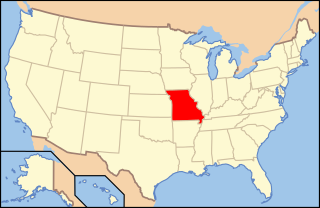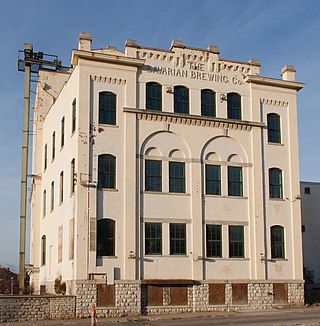Budweiser is an American-style pale lager, a brand of Belgian company AB InBev. Introduced in 1876 by Carl Conrad & Co. of St. Louis, Missouri, Budweiser has become a large selling beer company in the United States. Budweiser is a filtered beer, available on draft and in bottles and cans, made with up to 30% rice in addition to hops and barley malt.
Ice beer is a beer that has undergone some degree of freezing during production. These beers generally have a higher alcohol content, and lower price relative to it.

Low-alcohol beer is beer with little or no alcohol content that aims to reproduce the taste of beer while eliminating or reducing the inebriating effect, carbohydrates, and calories of regular alcoholic brews. Low-alcohol beers can come in different beer styles such as lagers, stouts, and ales. Low-alcohol beer is also known as light beer, non-alcoholic beer, small beer, small ale, or near-beer.

Anheuser-Busch Companies, LLC, is an American brewing company headquartered in St. Louis, Missouri. Since 2008, it has been wholly owned by Anheuser-Busch InBev SA/NV, now the world's largest brewing company, which owns multiple global brands, notably Budweiser, Michelob, Stella Artois, and Beck's.

Joseph Schlitz Brewing Company was an American brewery based in Milwaukee, Wisconsin, and was once the largest producer of beer in the United States. Its namesake beer, Schlitz, was known as "The beer that made Milwaukee famous" and was advertised with the slogan "When you're out of Schlitz, you're out of beer". Schlitz first became the largest beer producer in the US in 1902 and enjoyed that status at several points during the first half of the 20th century, exchanging the title with Anheuser-Busch multiple times during the 1950s.

Rolling Rock is a 4.4% abv American lager launched in 1939 by the Latrobe Brewing Company. Although founded as a local beer in Western Pennsylvania, it was marketed aggressively and eventually became a national product. The brand was sold to Anheuser-Busch of St. Louis, Missouri, in mid-2006, which transferred brewing operations to New Jersey while continuing to label the new beer prominently with the name of Latrobe.

Steel Reserve, also known as 211, is an American lager brand owned and produced by Steel Brewing Company, which is owned by Miller, a subsidiary of Molson Coors. The drink comes in "Black" and "Silver" varieties, also known as "Triple Export Malt Liquor" and "High Gravity Lager", respectively. It has a high alcohol content. It was introduced in 1994.
Beer in India has been prepared from rice or millet for thousands of years. In the 18th century, the British introduced European beer to India. Beer is not as popular as stronger alcoholic beverages like desi daru and Indian-made foreign liquor, such as Indian whiskey. The most popular beers in India are strong beers.

Beer in the United States is manufactured in breweries which range in size from industry giants to brew pubs and microbreweries. The United States produced 196 million barrels (23.0 GL) of beer in 2012, and consumes roughly 28 US gallons (110 L) of beer per capita annually. In 2011, the United States was ranked fifteenth in the world in per capita consumption, while total consumption was second only to China.

St. Pauli Girl is a brand of beer brewed and bottled for export only by the St. Pauli Brauerei, which is located within the Beck's brewery in Bremen, Germany an owned by AB InBev. In the U.S. it is brewed for the domestic market by St. Louis, Missouri-based Anheuser-Busch.
The United States Brewers' Association was a trade organization that existed from 1862 to 1986.

The alcohol laws of Missouri are among the most permissive in the United States. Missouri is known throughout the Midwest for its largely laissez-faire approach to alcohol regulation, in sharp contrast to the very strict alcohol laws of some of its neighbors, like Kansas and Oklahoma.
SABMiller was one of the top five global brewing companies, and had a range of over 150 beers, including international beers such as Pilsner Urquell, and Miller Genuine Draft, and local ones such as Gambrinus and Castle Milk Stout.

A drinking establishment is a business whose primary function is the serving of alcoholic beverages for consumption on the premises. Some establishments may also serve food, or have entertainment, but their main purpose is to serve alcoholic beverages. There are different types of drinking establishment ranging from seedy bars or nightclubs, sometimes termed "dive bars", to 5,000 seat beer halls and elegant places of entertainment for the elite. A public house, informally known as a "pub", is an establishment licensed to serve alcoholic drinks for consumption on the premises in countries and regions of British influence. Although the terms are increasingly used to refer to the same thing, there is a difference between pubs, bars, inns, taverns and lounges where alcohol is served commercially. A tavern or pot-house is, loosely, a place of business where people gather to drink alcoholic beverages and, more than likely, also be served food, though not licensed to put up guests. The word derives from the Latin taberna and the Greek ταβέρνα/taverna.
Anheuser-Busch InBev SA/NV, commonly known as AB InBev, is a Belgian multinational drink and brewing company based in Leuven, Belgium and is the largest brewer in the world. Additionally, AB InBev has a global functional management office in New York City, and regional headquarters in São Paulo, London, St. Louis, Mexico City, Bremen, Johannesburg, and others. It has approximately 630 beer brands in 150 countries.
Anheuser-Busch, a wholly owned subsidiary of Anheuser-Busch InBev SA/NV, is the largest brewing company in the United States, with a market share of 45 percent in 2016.

Bavarian Brewing Company was a brewery established in Covington, Kentucky, in 1866 by Julius Deglow, but became known as the Bavarian Brewery around 1870. The brewery was originally located on Pike Street, but expanded to 12th Street within a decade. After John Meyer acquired the brewery in 1881, he sold an interest to William Riedlin in 1882. The company operated under the proprietorship of Meyer & Riedlin starting in 1884, before becoming incorporated as the Bavarian Brewery Co. in 1889 by William Riedlin. The company was family owned until it was acquired by International Breweries, Inc.(IBI) in 1959. However, it operated as the Bavarian Division of IBI and continued to produce its flagship beer, Bavarian's, until the facility closed in 1966. The property was placed on the National Register of Historic Places and renovated as a multipurpose complex for food, beverage and entertainment uses in 1996. It operated as the Brew Works at the Party Source and Jillian's, but closed in 2006. The former structure containing the Brew and Mill Houses, built in 1911, was repurposed into office space becoming part of the Kenton County Government Center, opening in 2019. This office complex has a Bavarian Brewery Exhibit and it is accompanied by a Bavarian Brewery website.

The Florida Brewing Company building is a historic brewery building that once housed Ybor City Brewing Company, which became Florida Brewing Company. It has been restored and converted into a law office. It is the tallest building in Tampa's Ybor City Historic District.
The production of beer in New Jersey has been in a state of recovery since Prohibition (1919-1933) and the Great Depression (1929-1945). Currently, the state has 123 licensed breweries: a large production brewery owned by an international beverage company, Anheuser-Busch InBev, and 122 independent microbreweries and 19 brewpubs. The growth of the microbreweries and brewpubs since the 1990s has been aided by the loosening of the state's licensing restrictions and strict alcohol control laws, many of which were a legacy of Prohibition.

Eswatini Beverages Ltd (EBL) is a AB InBev subsidiary. It was a subsidiary of SABMiller until 10 October 2016 when it was acquired by Anheuser-Busch InBev. It is a beverage and brewing company in Matsapha, Eswatini. The company was formed in 1995 by the merger of Eswatini Breweries, Ngwane Breweries, and Eswatini Bottlers. EBL produces and markets soft drinks, beer, and other alcoholic drinks.














